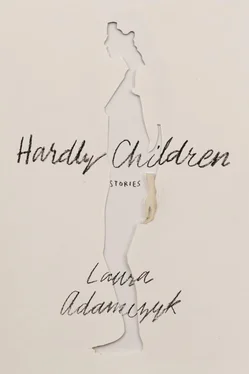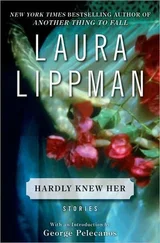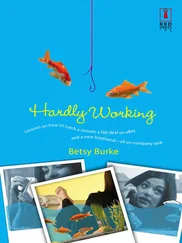In the afternoon, the father gives the oldest a thin fold of bills, and the girls run into a gas station to gather Corn Nuts and Twizzlers, Milk Duds and fun-sized bags of chips. They each choose the same kind so regularly that the father made a song of it. Or the father made the song and the girls oblige it. When they return to the truck he snaps his fingers and whisper-sings, FRI-tos / CHEE-tos / And po-TA-ta chips . They like the way he defines them, even arbitrarily, even through slippery plastic bags of processed corn and sodium. This is who you are, who you can continue to be. He isn’t there at home. He doesn’t know how the middle daughter has been taking hour-long showers at night, how nobody knows what she does in there for all that time. How the oldest, only twelve, came home from the movies with a hickey not two weeks ago, and then sulked at a family party in the backyard, eighty degrees and she red-faced and sweating in a turtleneck. The youngest, the mother has determined, will need braces, despite having quit sucking her thumb last year. He no longer day-to-days it with them, never really did even when he was in the house, and so the jingle. My little munch kins, he says, getting back on the highway, as though tickled at being a father, at having these three separate pieces of him beside him reading books, housing secret desires and preferences each her own. He sets the cruise control and turns on the music, a favorite song with funky piano and brass. Hey, he says, and bobs his head until the youngest and the middle join in. It’s like this, he says, gesturing with his hand, and they mimic him, as obedient as backup singers. The oldest, only twelve, nearly thirteen now, sometimes sullen, sometimes pouting, looks out the window, crosses her arms over her breasts, breasts she’s been hiding under big white T-shirts, breasts whose sudden existence has the father calling the girls’ underwear unmentionables : Don’t forget your unmentionables . I’ve washed your unmentionables . C’mon, the middle says, pushing at the oldest’s shoulder. She hates how the oldest must now be convinced to participate, hates her creeping sense of power, as though her presence were a gift and one to be doled out judiciously. They have to make her forget the girl she’s becoming at school, the girl who quietly gets straight As but who hangs out with the tan, popular girls, is one of the tan, popular girls now, girls getting new bras, girls who let boys suck on their necks in the back row of their small town’s single-screen movie theater. At home her sisters try to coax her into her previous self, an old dress that still fits but which she is sick of. What’s wrong with it? her mother would say. You used to love that dress. C’mon, the middle says, and bumps her again. The middle shakes her shoulders, as if the oldest—only twelve yet moving exponentially beyond her ten-year-old sister—merely forgot how to do it. Cut it out , she replies, and the middle says, Fine, jeez, and keeps dancing. Her movements are more contained, now only pretending to have fun, so as to show the oldest she doesn’t need her.
The middle sister was there that night at the theater. She sat up front with her best friend, who, a third of the way in, nudged her and whispered, Look , and the middle turned to see her sister in a far corner with some skinny, freckled boy on her neck, her face stiff, eyes open. The middle looked back to the movie, now lost as to who the characters were, why they were doing what they were doing. The middle did not tell the mother, though she wished for her sister’s punishment. She watched her mother discover the thing on her neck the next morning, breathing the oldest’s name like a curse, and dig out the turtleneck so that she could play ping-pong and eat potato salad and sit on the backyard swing staring into nothing.
When the song ends and the father rewinds the tape, the intro building again, the middle says, Come on, one last plea that’s no longer pleading, a tone that says, I know what you’re doing, I know why you’re doing it, but isn’t this more fun? The oldest angles away from the middle then looks back over her shoulder. She smirks and moves her eyebrows up and down. The middle snorts.
Stop it, she says.
What, the oldest says. I’m dancing. She shakes her shoulders slyly.
Dance normal.
I am dancing normal. She closes her eyes and shakes her head back and forth, hopping in her seat, her hair whipping around her face. It’s a real freak-out! the oldest says. Seeing her, the father hams more. He closes his eyes and uses his fist as a microphone. The middle joins in as the brassy payoff returns, and for a moment, they all coordinate, punching their fists in time to the chorus. This will be the last summer like this. Next year, the oldest will insist on cheerleading camp and the father will instead have them for a week at his house. There will be trips to the park district pool, where the girls will eat nachos and Italian ice and look at boys and call their father to delay when he’ll pick them up. The music is just louder than loud, and it opens up a good feeling inside the middle’s chest. It makes her uneasy. As on the last day of school when she and her classmates had written their names and addresses on slips of paper tied to balloons and released them in the parking lot. She watched her balloon rise—one among the dozens—up to the tops of trees and beyond, a shrinking yellow dot.
* * *
THEY DRIVE THROUGHthe night. The father buys coffee; the girls run into gas station bathrooms—tired yet alert and giggling—the dull yellow lights swirling with mosquitoes. The girls go into the back of the capped truck, where the dad has laid out a futon and a pile of blankets. The highway lights run one after another over the truck as though propelling it forward. The middle loves the late-night driving hours, hours usually kept away from her. Fifteen years later, after the father will complete his slow, early death, the middle sister will think of those together-yet-separate hours on the night drive: she and her sisters dozing, her father up front, a slit in the window for his cigarette smoke to slip out of. Always there will be the same wonder: What did he think in those adult hours? Who was he then?
* * *
IN THE MORNINGthey stop at a small-town McDonald’s, eating outside in the bright, early sun. The street, lined with trim green lawns, leads to a stoplight and a row of antique shops and bars. After they eat, the father lights a cigarette and spreads out the atlas. The oldest, sitting at the next table, leans over her book.
The middle takes the youngest a block down the street to a park, clambering up the curving metal slide, running across a wobbly wooden bridge. They climb on top of the monkey bars and crawl on hands and knees. She sends the youngest back, watching her dash across the empty street, and walks over to the swing set on the other side of a tall, needle-thick pine. They learned it as an accident, at the beginning of the summer at the playground across the street from the mother’s house. A swing set with a metal trapeze bar hanging from two chains. The oldest sister and her friends would, one at a time, wrap their legs around the angled support beam and slide up, so they could sit on top of the high bar and swing. After a while they stopped going for the bar, only sliding up then down the beam. It tickles, one said, and the others laughed, the middle standing, watching. Three weeks, three bored summer weeks while the babysitter and the youngest sister stayed back home under the ceiling fan, eating ice-cream sandwiches and watching music videos. Then the oldest sister and her friends stopped going to the park. There was a girl down the street with a pool and a mother who worked nights. You can’t come, the oldest said, and bought a bikini with her own money. The middle sister felt betrayed but knew she would have repeated the betrayal to her younger sister if she’d been allowed to join them. The next week, on the night of the movie, the oldest and the middle stood outside the theater waiting, and when the oldest sister’s friends arrived, she joined them in a circle—arms crossed, their long, thin legs sprouting out from bright cotton shorts. A girl one grade ahead of them passed by, a girl with big brown hair and a cropped white shirt, with pink and purple beads at the ends of its tassels like a jeweled curtain. She walked with one hip out ahead of the other, and it made her look at once filled with attitude and injured. That girl is a cunt, one of them said matter-of-factly, and the others snorted. The oldest looked behind her, and the middle, leaning against the theater’s brick exterior, turned her head to pretend she hadn’t heard. The unknown word put a blood-taste in her mouth. Metallic like the smell of the bar she leans her body on now. She closes her eyes. Her breath is slow and quiet, the only sound she hears but the wind in the trees, the distant whisper of a car. She slides herself up the bar until the tickling feeling leaks out of her. She slides down, her feet crunching into the bed of pebbles, and her older sister is behind her saying, You shouldn’t do that.
Читать дальше











